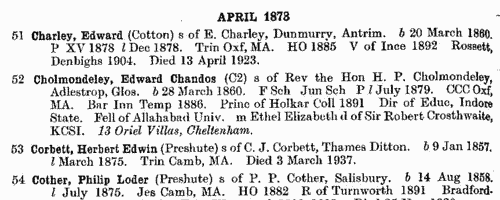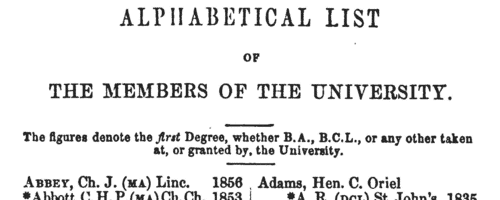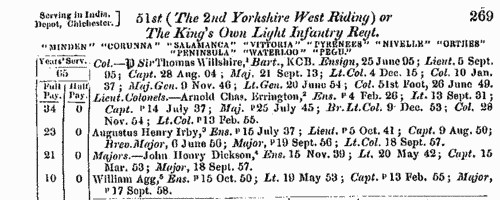Add this eBook to your basket to receive access to all 2,451 records. Our indexes include entries for the spelling hunter. In the period you have requested, we have the following 2,451 records (displaying 1,521 to 1,530): These sample scans are from the original record. You will get scans of the full pages or articles where the surname you searched for has been found. Your web browser may prevent the sample windows from opening; in this case please change your browser settings to allow pop-up windows from this site.  Sailors and marines on board Her Majesty's ship Winchester
(1856-1860) Sailors and marines on board Her Majesty's ship Winchester
(1856-1860)
The China Medal was awarded to soldiers and sailors involved in the various actions of the war against China, in which this ship was engaged from 1856 to 1860. The medals were either delivered on board or sent on in 1862: except that many of the men were no longer immediately traceable, and the remarks on the roll show that some medals were not sent on for several years, and some were never sent. | Sample scan, click to enlarge

| Unclaimed Naval Prize Money from the China War
(1856-1860)
Various prize moneys were awarded to officers and men who served on board her Majesty's ships on the China Station during the war of 1856 to 1880. Firstly, there was a parliamentary grant of one month's pay to those serving on the Acorn*, Actaeon*, Adventure, Algerine*, Amethyst, Assistance*, Banterer*, Barracouta, Belleisle, Bustard, Calcutta*, Camilla, Clown*, Comus, Cormorant, Cruiser*, Drake*, Elk*, Encounter, Esk*, Firm*, Forester*, Furious*, Fury, Haughty*, Hesper*, Highflyer*, Hornet*, Inflexible*, Janus*, Kestrel*, Lee*, Leven*, Melville, Minden, Nankin*, Niger*, Nimrod*, Opossum*, Pique, Plover*, Princess Charlotte, Racehorse*, Raleigh, Sampson*, Sans Pareil*, Slaney*, Spartan, Starling*, Staunch*, Surprise*, Sybille*, Tribune, Volcano*, Watchful*, Winchester, and Woodcock*; in addition Canton booty was awarded to those serving on the ships asterisked (plus the Bittern and Coromandel tenders) at Canton on 28 and 29 December 1857, when that city was bombarded and captured. Then those on board the Bustard, Cruiser, Esk, Forester, Haughty, Highflyer, Lee, Niger, Nimrod, Sampson, Surprise, and the boats of the Elk, were rewarded for the captures of junks for breach of blockade of Canton River between 29 August and 19 December 1857. Other captures made by her Majesty's ships led to various other awards distributed between 1 January 1855 and 19 February 1863. Nevertheless, for one reason or another a substantial number of these prizes, from as little as 1s 7d to as much as £28, remained undistributed by 1902, when this comprehensive list of the unclaimed moneys was printed. In each case the sailor's name is given first (surname, then christian name or initials); rank or rating; ship in which serving at time of capture or award; parliamentary award; Canton booty; captures for breach of blockade of Canton River; other captures; and then the total. | Sample scan, click to enlarge

|  British infantry fighting in China
(1858-1860) British infantry fighting in China
(1858-1860)
The China Medal was awarded to soldiers and sailors who took part in the prosecution of the war against the Chinese from 1856 to 1860. Separate clasps were awarded for men who had been in receipt of the China Medal of 1842; for being actually present at Canton on 28 and 29 December 1857, when that city was bombarded and finally captured; for being actually engaged in the operations which ceased with the first capture of the Taku Forts, 20 May 1858, and led to the Treaty of Tientsin; for being actually present at the capture of the Taku Forts 21 August 1860; and for being actually present before Pekin the day the gate of that city was given up to the allied (British and French) army, viz. on 13 October 1860. The 2nd battalion, the 1st (The Royal) Regiment of Foot, based at Birr, left Ireland for Cephalonia 31 January 1853. After fighting in the Crimea, the battalion was moved to Malta, then to Gibraltar; was transferred from Gibraltar to China in 1858; and did not return to England until 1861. The battalion took part in the capture of the Taku Forts and that of Pekin. | Sample scan, click to enlarge

| Boys entering Marlborough College
(1860)
The public school at Marlborough in Wiltshire was founded in 1843. In 1952 this, 9th, edition of the college register was published, being a revision by L. Warwick James of the 8th edition (of 1936): but for the years before 1936 it does not merely repeat the 8th edition, because Warwick James was able to correct the 19th-century entries with information from newly-discovered letters and books from 1843 to 1853, and the school lists from 1844 onwards. The roll is arranged by year, and within each year by term of entrance, and then alphabetically by surname within each term. Each boy is assigned a number within the year: then his name is given, surname first, and, in brackets, where a boarder, his house. The houses within the college were called B1, B2, B3, C1, C2 and C3, and the Lower School (L Sch); the out college houses were Preshute, Priory, Cotton, Hermitage, Littlefield, Barton Hill, Summerfield and Upcot. Then there is given the boy's father's name (surname and initials) and address (at entrance), the boy's date of birth (b) and month of leaving (l). Where the boy represented the school at Rugby football (XV) or cricket (XI), in the rifle corps (VIII, or RC XI), that is indicated. There is a brief summary of achievements in later life, and, where known, and date of death or (in italics) address as in 1952. | Sample scan, click to enlarge

|  British infantry fighting in China
(1860) British infantry fighting in China
(1860)
The China Medal was awarded to soldiers and sailors who took part in the prosecution of the war against the Chinese from 1856 to 1860. Separate clasps were awarded for men who had been in receipt of the China Medal of 1842; for being actually present at Canton on 28 and 29 December 1857, when that city was bombarded and finally captured; for being actually engaged in the operations which ceased with the first capture of the Taku Forts, 20 May 1858, and led to the Treaty of Tientsin; for being actually present at the capture of the Taku Forts 21 August 1860; and for being actually present before Pekin the day the gate of that city was given up to the allied (British and French) army, viz. on 13 October 1860. The 1st battalion, the 3rd (East Kent) Regiment of Foot (the Buffs), based in Limerick, embarked for Malta 2 April 1851. The battalion took part on in the capture of the Taku Forts. | Sample scan, click to enlarge

|  British infantry fighting in China
(1860) British infantry fighting in China
(1860)
The China Medal was awarded to soldiers and sailors who took part in the prosecution of the war against the Chinese from 1856 to 1860. Separate clasps were awarded for men who had been in receipt of the China Medal of 1842; for being actually present at Canton on 28 and 29 December 1857, when that city was bombarded and finally captured; for being actually engaged in the operations which ceased with the first capture of the Taku Forts, 20 May 1858, and led to the Treaty of Tientsin; for being actually present at the capture of the Taku Forts 21 August 1860; and for being actually present before Pekin the day the gate of that city was given up to the allied (British and French) army, viz. on 13 October 1860. The 44th (The East Essex) Regiment of Foot, based at Colchester, having returned from the Crimea, embarked for India 26 August 1857, and was transferred thence to China. The regiment took part in the capture of the Taku Forts. | Sample scan, click to enlarge

|  British infantry fighting in China
(1860) British infantry fighting in China
(1860)
The China Medal was awarded to soldiers and sailors who took part in the prosecution of the war against the Chinese from 1856 to 1860. Separate clasps were awarded for men who had been in receipt of the China Medal of 1842; for being actually present at Canton on 28 and 29 December 1857, when that city was bombarded and finally captured; for being actually engaged in the operations which ceased with the first capture of the Taku Forts, 20 May 1858, and led to the Treaty of Tientsin; for being actually present at the capture of the Taku Forts 21 August 1860; and for being actually present before Pekin the day the gate of that city was given up to the allied (British and French) army, viz. on 13 October 1860. The 99th (Lanarkshire) Regiment of Foot, based at Cork, embarked for India in September 1858, and was transferred to China in 1860; moved to South Africa in 1865, and returned to England in 1869. The regiment took part in the capture of Pekin. | Sample scan, click to enlarge

| Civil Service Appointments
(1860)
The Civil Service Commission published an annual list of all persons who had obtained certificates of qualification for appointment in the various public departments. The list gives full name (surname first); department (such as Post Office, or Inland Revenue); situation (such as Letter-carrier, or Clerk); and date of certificate. Candidates whose names are preceded by a dagger obtained appointments as the result of competition; a double dagger indicates open competition. Those whose names are preceded by an asterisk obtained honorary additions to their certificates either for proficiency in extra subjects chosen by themselves, or for marked proficiency in the prescribed subjects. Then follows a further list of these candidates who had obtained Honorary Additions to their Certificates in this way: giving name (surname and initials); position in the service (department and situation); subjects for which honorary additions were made; and 'extent of knowledge displayed' (such as Creditable, Fair, or Very Creditable). 1 January to 31 December 1860. | Sample scan, click to enlarge

| Members of Oxford University
(1860)
The Oxford University Calendar for 1860 includes this list of all living members of the university, i. e. not only undergraduates and members of staff, but also all surviving graduates from earlier generations. The names are arranged alphabetically by surname, then by college in order of foundation. Surnames are given, initials, highest degree, name of college, and then the year of graduating the first degree. For undergraduates only name and college is given. An asterisk before a surname indicates a member on the foundation of the college. | Sample scan, click to enlarge

| Officers of the British Army
(1860)
The New Annual Army List first lists officers of the rank of major and above, by rank, and with dates of appointment to each successive higher rank, and (where appropriate) when placed on half pay. An asterisk indicates temporary rank; a superscript p shows that a commission was purchased; a dagger shows officers on the half pay of their last regimental commission. An ornate W indicates those officers actually present in any of the actions of 16, 17 or 18 June 1815 and therefore awarded the Waterloo Medal; P is put before the name of an officer who served in the Peninsula or the South of France; T for the Battle of Trafalgar; VC for the Victoria Cross. For each officer in this section, the final column notes his then present or immediately former regiment and/or office, if any. Next, all the officers of the army are listed, down to the rank of ensign, by regiment or corps, giving rank, name, date of rank in the regiment, and date of rank in the army, with occasional further notes. Again, holders of medals are duly noted, as in the first list. For each regiment the paymaster, adjutant, quartermaster, surgeon and assistant surgeons are named, as well as the civilian agent; and the regimental motto, battle honours, and colours of the facings and lace of the dress uniform are stated. After the British regiments of the line, the Rifle Brigade, the officers of the West India infantry, the Ceylon rifles, the Cape Mounted Riflemen, the Royal Canadian Rifles, St Helena Regiment and the Gold Coast Artillery Corps are given; then the officers of the garrisons and other military establishments; the Royal Artillery; Royal Engineers; Royal Marines; Commissariat Department; Medical Department; Staff Officers of Pensioners; Chaplains' Department; Staff (of Great Britain, Australia, Bahamas, Bermuda, British Columbia, Cape of Good Hope, Ceylon, East Indies, Falkland Islands, Gibraltar, Heligoland, Hong Kong, Ionian Islands, Jamaica (including Honduras), Malta, Mauritius, Newfoundland, North America, St Helena, the Western Coast of Africa, and the Windward and Leeward Islands); Military and Civil Department; and Barrack Masters. Then there is a separate list of officers retained on retired full pay and half pay (including the German Legion, the Brunswick Cavalry, the Brunswick Infantry, Chasseurs Brittaniques, Royal Corsican Rangers, the Greek Light Infantry, Royal Malta Regiment, Meuron's Regiment, Roll's Regiment, Sicilian Regiment, Watteville's Regiment, the York Light Infantry Volunteers, Foreign Veteran Battalion and the Foreign Corps of Waggoners). | Sample scan, click to enlarge

|
Research your ancestry, family history, genealogy and one-name study by direct access to original records and archives indexed by surname.
|












